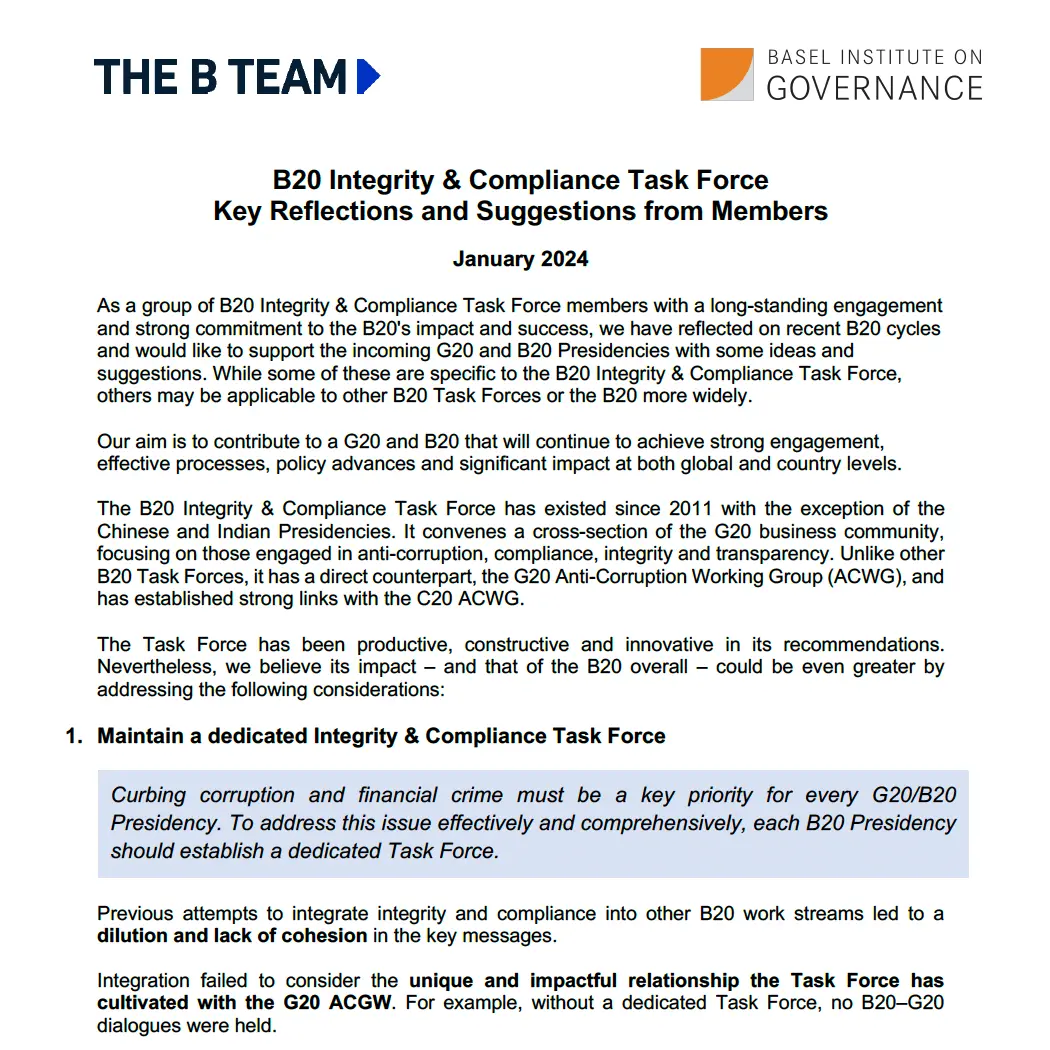B20 & anti-corruption
B20 and anti-corruption
B20-G20 dialogues on integrity and anti-corruption over the years, and how to enhance their effectiveness

The Business 20 (B20) represents the voice of business in the G20, an intergovernmental forum representing the world's major economies. It acts as a platform for dialogue between businesses and the G20 presidency, which rotates each year, with input from civil society and international organisations.
As a multi-stakeholder forum for international economic cooperation, the B20 concentrates on topical high-priority issues that affect the stability and strength of the global economy and the ability of companies to compete on a level playing field.
Given the B20's influence on both government policies and the private sector, it is crucial that issues of business ethics and integrity are central to B20 recommendations.
The Brazilian National Confederation of Industry (2024 B20 Secretariat) is proud to elevate the B20 Collective Action Hub and its newly co-developed Collective Action Key Performance Indicator (KPI) as a legacy initiative of the B20 Brazil.
The B20 Collective Action Hub will continue to support high-level discussions on integrity and compliance beyond the B20 Brazil presidency, cementing its commitment to ethical business practices. The introduction of a KPI based on the data collected by the B20 Collective Action Hub will provide a strong basis for future B20 cycles to call on more G20 governments to engage and support Collective Action initiatives to strengthen the business integrity agenda.
The Basel Institute will update the B20 Collective Action KPI on an annual basis to enable a strong and united B20 voice on Collective Action.
This open online resource is designed for policymakers and practitioners from any sector involved in B20-G20 anti-corruption dialogues. It provides:
- Frequently asked questions on the B20 process and how different B20 presidencies have dealt with topics of integrity and anti-corruption.
- Country pages with excerpts on anti-corruption from the official B20 policy documents and downloads of the original sources. The excerpts are particularly focused on Collective Action tools and approaches.
- Recommended reading on the B20, G20 and anti-corruption.
We hope it will support the continuity and effectiveness of each new B20 cycle, giving stakeholders the information they need to understand past cycles and extract lessons learned.
Visit the UNODC G20 Anti-Corruption Resource page to find out more about the anti-corruption work at the G20.
Key publications

Report
Key Reflections and Suggestions from Members
2024 | B20 Integrity and Compliance Task Force
FAQs on the B20 process and anti-corruption
Explore resources
B20 work on anti-corruption
Recommended reading on anti-corruption in the B20-G20 process
General commentary on the G20, business and anti-corruption
- B20 Integrity and Compliance Task Force - Key Reflections and Suggestions from Members (2021), published by the World Economic Forum Partnering Against Corruption Initiative (PACI) and The B Team
- A Business Platform to Shape the G20 Agenda (2014) - article by the International Chamber of Commerce (ICC), published by the World Commerce Review
- The OECD and the G20: An ever closer relationship? (2011) - article by Jan Wouters and Sven Van Kerckhoven, published in The George Washington International Law Review
- Leading by example: implementing Anti-Corruption Summit commitments on transparency in public procurement (2016) - a Wilton Park report in association with Transparency International, The B Team and the Open Contracting Partnership
OECD contributions to the G20 on anti-corruption
Relevant G20 high-level principles
- High-Level Principles on the Liability of Legal Persons for Corruption (2017)
- High-Level Principles on Organizing Against Corruption (2017)
- High-Level Principles on Countering Corruption in Customs (2017)
- G20 High-Level Principles on Private Sector Transparency and Integrity (2015)
- G20 High-Level Principles for Promoting Integrity in Privatization and Public-Private Partnerships (2020)
- G20 High-Level Principles on Beneficial Ownership Transparency (2014)
B20 process analysis and review mechanisms
- G20-B20 Dialogue Efficiency Taskforce report 2013
- ICC G20 Scorecard first edition
- ICC G20 Scorecard second edition
- ICC G20 Scorecard third edition
- ICC G20 Business Scorecard fourth edition
- ICC G20 Business Scorecard fifth edition
- ICC G20 Business Scorecard sixth edition
- G20 Responsiveness Report - B20 Evaluation of the Hamburg G20 Leaders’ Declaration: Shaping an Interconnected World
B20 and G20 Anti-Corruption Working Group joint documents
About this resource
This resource is maintained by the Basel Institute on Governance. It was developed with funding from the Siemens Integrity Initiative following a mandate from the B20 in 2013 to develop a global resource centre on anti-corruption Collective Action.
The Basel Institute has actively contributed to the anti-corruption discussions of the B20 since its inception, generally with a formal role as Network and Knowledge Partner. Collective Action has been a reoccurring theme of these discussions and resulting recommendations. A specific milestone was the development of the Collective Action Key Performance Indicator under the 2024 B20 leadership in Brazil. The Basel Institute will continue to track performance against the indicator via the database.
Please send comments, questions and suggestions relating to the B20 anti-corruption work and this resource to: scarlet.wannenwetsch[@]baselgovernance.org.










